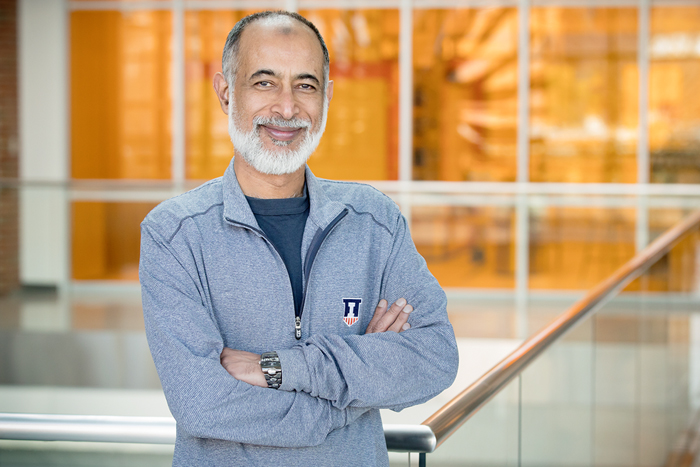CHAMPAIGN – Long-time community member and activist died unexpectedly of respiratory complications Wednesday night at age 66.
Dr. Irfan Ahmad was an active and well-known member of the central Illinois Muslim community.
“He was always just an advocate for underserved communities, particularly the Muslim community, particularly immigrants, but you know, particularly Pakistanis, because, you know, those are the identities that he carries,” said Irfan’s daughter, Roveiza.
One of his last acts was dropping off food for the Palestinian encampment.
“Part of why it was just a little bit hard for us right now is because he was, you know, on his feet until the last moment,” said Irfan’s son, Umair.
He is survived by his wife, a son, a daughter, and two grandsons.
“At his core was a teacher, like this is somebody who came to the U.S. as a student, and then really embraced the role of being an instructor,” said Umair.
Dr. Irfan Ahmad held several key positions during his career. He was the executive director of the Center for Nanoscale Science and Technology for many years. In 2017, he became the Executive Director of Interdisciplinary Initiatives at Grainger Engineering and was appointed Assistant Dean for Research and Research Professor of Biomedical and Translational Sciences in 2019.
“This was somebody who was very excited to go to work, he really enjoyed being on a college campus,” said Umair. “He loved interacting with students [and] being around research, around science.”
He was the lead founder in 2009 of Avicenna, a free clinic on Kenyon Road in Champaign for underinsured and uninsured people.
Irfan came to the United States from Pakistan in 1989. He came as a UIUC student and stayed for over 30 years.
“This is really a place that he was very committed to: Central Illinois, Champaign-Urbana, this city, this town. He really believed in it,” said Umair.
“He just was everywhere, all over Urbana-Champaign, I think anyone who’s lived in Champaign-Urbana, in the last 30 years, probably saw his face pop up somewhere or another,” said Roveiza.
Umair said his father always loved to work at the intersection of medicine, engineering, mentorship and entrepreneurship.
“Irfan had his imprint on the first NSF IGERT training grant on Cellular and Molecular Mechanics and Nanotechnology, training grant in Cancer Nanotechnology, the NSF IUCRC on Agricultural and Pharmaceutical Nanotechnology, and many others — too many to count,” he said in a Carle Illinois College of Medicine press release.
Irfan was widely known to the UIUC community, the Muslim community, the medical research community, and the Palestinian liberation movement.
The encampment of protesters for Palestine on UIUC’s Main Quad held a memorial service for Ahmad on Thursday. The service had five speakers, most of whom touched on Irfan’s drive to see his students succeed.
“He has been fighting for the cause of divestment and Palestinian Liberation on the UIUC campus for more than a decade,” said one encampment organizer.
Organizers say Irfan came to the encampment early Wednesday morning, at 2 a.m., to drop off some fruit, and left shortly after. They say he has been in meetings non-stop for the last few days to get them in contact with administration.
“You could see in his eyes that this was something he felt so strongly about,” said one encampment organizer. “At the end of the day, one thing he cared about immensely was the safety of his students. It was beautiful.”
About 20 people came out to the memorial service at the encampment. There were people from the Central Illinois Mosque & Islamic Center, the medical school and Avicenna.
“We hope we can continue to live to do the service work and serve our community in the ways that he has shown so many people to do,” said Roveiza.
Umair said his father has been a vocal activist since his arrival in the states. He was involved in political activism attending protests against the genocide in Bosnia in the early ’90s.
“At the end of the day, we feel so privileged, being here, to be able to grieve in peace and to be able to, you know, talk about our dad and share his stories and have a proper funeral and burial,” said Roveiza.
“It makes our heart ache that, you know, the people in Palestine and Gaza continue… have this incessant onslaught of airstrikes, and are not having that privilege.”

